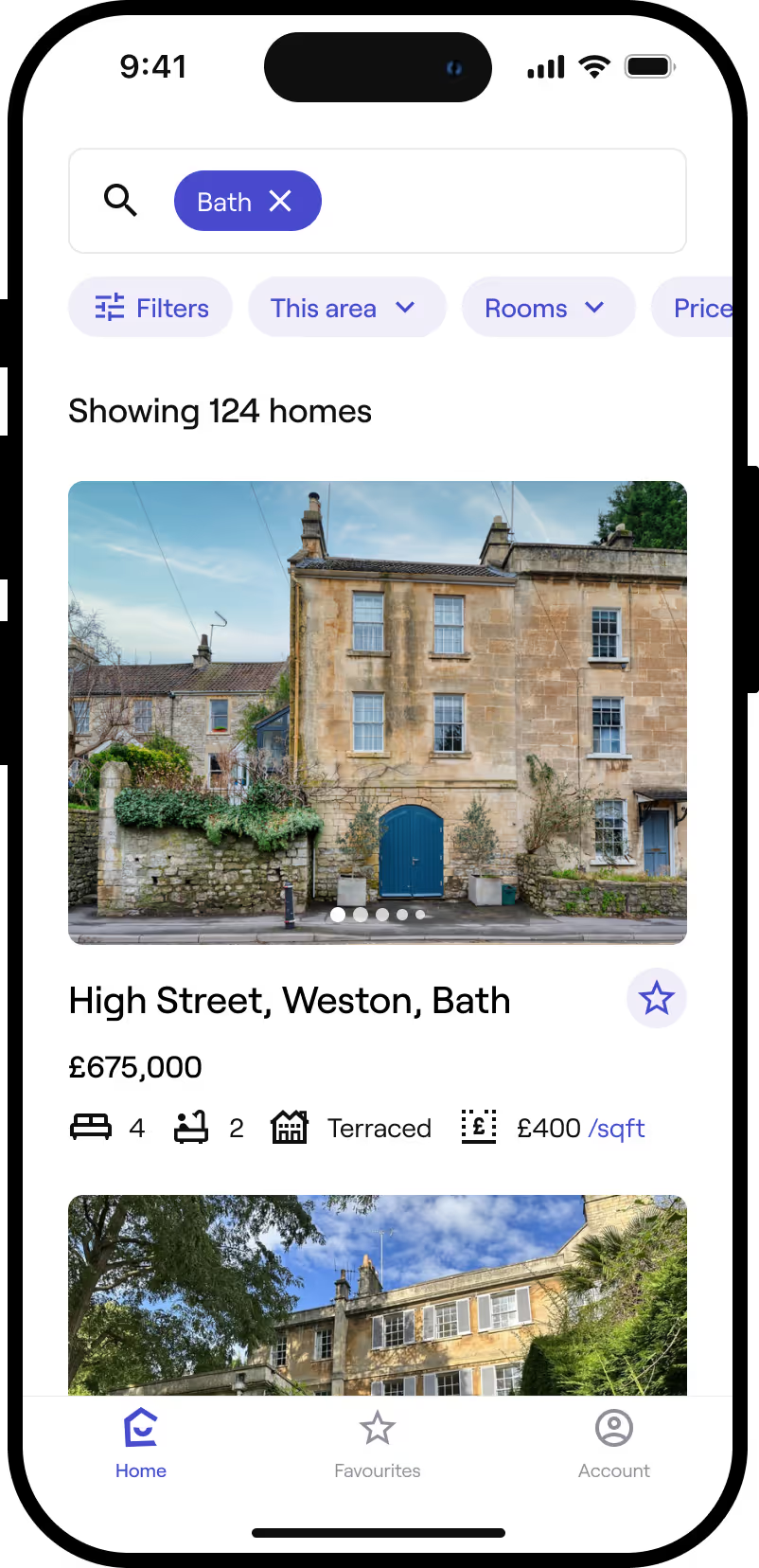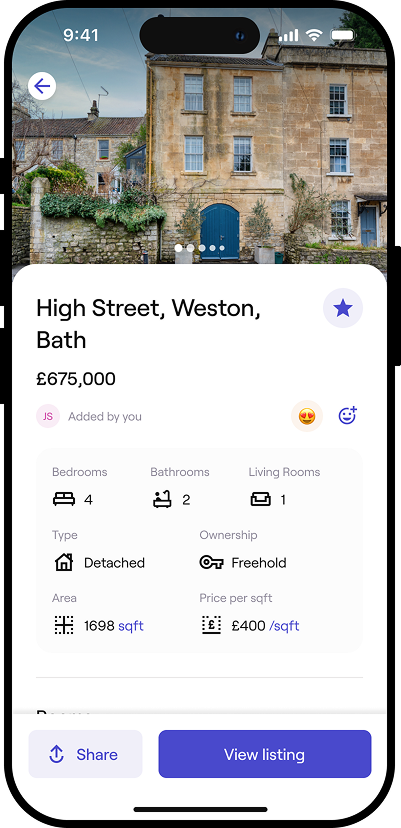Read This Before You Start Your Property Search
Liv Jacobson is Jitty's resident real estate expert. She was formerly the Head of Sales at The Modern House, one of the UK’s most respected estate agencies, and has a deep understanding of the property market from every angle. Having personally handled the sale of hundreds of homes across London - from first-time buyer flats to complex, architectural one-offs -Liv knows what really happens behind the scenes, how agents think and what buyers often get wrong (or right).

You’ve saved. You’ve scrolled. You’ve watched enough “Location, Location” to quote it in your sleep. But before you waste months chasing listings you can’t afford or viewings you’re not ready for, read this. It’s everything you need to know before you start your search - without the waffle.
WTF is a Mortgage in Principle and Why Do I Need One
First, what is an MiP?
A Mortgage in Principle (MiP) is your proof of purchasing power. It’s a simple letter from a lender that says, based on what they’ve seen, you could borrow up to £X. While it’s not legally binding, it’s taken seriously by estate agents.
You’ll almost certainly need one to make an offer. In competitive markets, some agents may even ask for it before you can book a viewing - this was often the case during the post–Covid housing boom in 2021.
How to get one
The easiest way is to use a mortgage broker. If a friend recently bought a home, ask who they used. No shame in the text: “Hey, was your mortgage broker any good?” Otherwise, national brokers like London & Country are a solid, fee-free place to start.
A good broker will run the numbers, check your credit (usually a soft check so your score won’t be impacted), and get you an MiP. Often within a day.
The fine print: common hurdles and pro-tips
Getting an MiP is straightforward for most, but here are the situations where it gets fiddly:
Self-employed?
This is a big one. Lenders will want to see at least two years of official income records (like tax returns or certified accounts) to prove your earnings are stable. If you’ve only been trading for a year - even if you’re making good money - most lenders won’t consider that income.
The hard truth: this is usually a non-negotiable, and it means you may have to pause your home search until you have that two-year history.
Earning commission?
Don't count on that one massive deal you closed last month to carry your application. Lenders will want to see at least three months of consistent payslips to calculate a reliable average income. If you're on a hot streak, now is the time to apply.
Bonuses or RSUs?
This is where a good broker really earns their fee. One lender might only agree to count 50% of your annual bonus, while a specialist lender might count 100%. A broker’s job is to know which lender will look most favourably on your specific pay structure, potentially adding tens of thousands to your borrowing power.
Cash buyer?
Lucky you. But you still need proof of funds, usually a recent bank statement. Pro-tip: Consolidate the exact amount needed for the purchase into one account beforehand. Some agents have been known to use a high balance as leverage to push for a bigger offer. Yes, that sucks.
An MiP doesn’t commit you to anything. But without one, you’re just window shopping. You risk wasting weeks viewing homes you can't actually afford, and you won't be able to make an offer when it counts. If you’re even semi-serious about buying, get one.
Key Takeaways
- A Mortgage in Principle is a non-binding proof of purchasing power; you'll need it before you can make a serious offer.
- The easiest way to get one is via a mortgage broker, who can also help navigate tricky income situations like self-employment or bonuses.
- Having an MiP is what makes you a credible buyer in the eyes of estate agents, putting you in a position to move quickly and make an offer when you find the right home.
The 5% Deposit Is a Psy-Op: 10% Is the Real Minimum
Some lenders will offer you a mortgage with a 5% deposit. Don’t be fooled by that. The 5% figure is marketing; the number you actually need is 10%
The number agents and sellers really care about is the 10% exchange deposit. This is the standard because if you pull out after exchanging contracts, the seller legally keeps that money. A 5% deposit doesn't offer enough security, so many sellers simply won’t accept it.
An offer with 10% isn't just stronger; it's often the minimum to be taken seriously. In a competitive market, a 5% deposit puts you at the back of the queue at best. At worst, you're not in the queue at all.
For a £300,000 property, that’s £30,000 in real cash that your solicitor needs to see in your bank account. If you're getting help from family (a "gifted deposit"), get that money transferred well in advance.
And remember, this is just the deposit. You'll need a separate pot of cash for legal fees, surveys and Stamp Duty. And, obviously, having a deposit of 10% or more not only makes your offer competitive but can also unlock better mortgage rates.
Key Takeaways
- The 5% mortgage deposit is not enough to get the deal done for many homes
- A 10% deposit makes your offer more competitive.
- You’ll need to account for other costs on top of your deposit, like Stamp Duty, surveys and legal fees.
Why "Location, Location, Location" is Kind of a Lie
You've heard the mantra: "Location, location, location." It’s the most repeated phrase in UK property. They made a bloody TV show about it that we referenced at the beginning of this article. But in 2025, it’s misleading. Location matters, but it doesn't explain why two homes on the same street can have wildly different price tags.
The truth is that two levers really drive a property's value: location and property style. Buyers obsess over the first, but the second often has more impact.
A well-maintained period home in Hackney can be worth double the price of an ex-council flat a few doors down. Same postcode, same park, same tube station. The difference is what buyers are willing to pay for style and finish.
Pricing is hyper-specific. It changes from one street to the next. Even on the same road, two houses with similar layouts can be valued differently based on their condition or architectural quirks. This is why postcode-level averages, although useful, don’t tell the whole story (and why starting your search without a postcode is sometimes a better idea).
So, this is the first big trade-off every buyer faces:
- Do you prioritise the location you love and compromise on property type (like an ex-council flat)?
- Or do you prioritise your dream home style (like a period house) and search in a wider, more affordable area?
Understanding this choice early helps you avoid tunnel vision. Being flexible on either location or style will open up more options and stop you from wasting time chasing homes you can't afford.
Key Takeaways
- A property's style often has just as much impact on its price as its location.
- A big trade-off is deciding which you’ll compromise on: your preferred area or the preferred property style.
- Being flexible on either location or style is the secret to finding a home you can actually afford.
______________________
You can’t control the market, the agents or the chain. You can only control your preparation which, we know, is the most boring, boomer advice imaginable. But it’s true damnit!
Get these things right and you’ll be ready to start your search on the front foot.
Questions You Might Have
Head down a different street...
Download the Jitty app now
Experience homebuying as it was meant to be.







